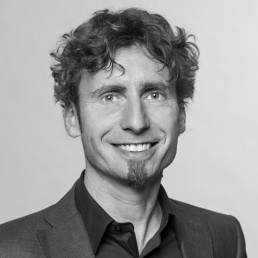We can shape the handling of digitisation in a healthy way!
Living healthy in the digital working world – Prof. Dr. Filip Mess draws attention to the health demands caused by digitalisation and has valuable tips on employee health at hand.
Why does the health aspect play such a large role in companies?
Our working world is currently changing rapidly. Without a healthy workforce, it is difficult for companies to meet current and future challenges. One example is the digitized world of work. The aim of companies must therefore be to maintain, promote and, if necessary, restore the health of their employees. Otherwise, there is the danger of oversleeping the changes and no longer being able to survive on the market.
What are the health risks in the digitalised world of work?
Three trends characterise digitisation: information, interaction and artificial intelligence. These trends result in changes and health risks. One example is the constant accessibility through media. Work and private life become blurred. The consequences range from exhaustion to burn-outs. Another example is the constantly new technologies that we have to deal with at work. This requires lifelong learning. Those who can’t keep up will be left behind. The flood of information is increasing, so that we have less and less time for projects and activities. Stress increases, dissatisfaction rises. Dissatisfaction also rises due to ever decreasing self-determination. Machines and stakeholders are increasingly “driving” us. On the other hand, stakeholder expectations are also growing. These factors lead to dissatisfaction and stress, which ultimately nibbles at our psyche.
How can a company promote the health of its employees under these conditions?
Companies should first find out where health potentials and risks lie by means of a classic health survey. It is also important to find out which measures employees would like to take, because health should be positive in general. Health can, for example, be positive through the combination with playful elements, keyword gamification. The responsibility lies with the managers. Companies must sensitize their managers to their role as health-conscious managers and prepare prospective managers for this role.
And what can individual employees do to stay healthy and fit in a digitized world?
We can’t stop digitization. But we can make the handling of digitisation healthy. Employees should also be offline at times, i.e. consciously plan recovery times. Employees should take digitalization as an opportunity, but at the same time also take a critical look at it and not follow every new development blindly and without reflection. To do this, they must try out the new forms of working and leading and integrate them into their daily work.
Let’s take a look into the future: Which topics will occupy the world of work in ten years’ time as digitalisation progresses?
In ten years lifelong learning will have brought about a cultural change. It will no longer be just a question of whether we embed lifelong learning in schools and universities, but how. We need to build trust in artificial intelligence and in big data – we can learn together with machines and make decisions in the course of artificial intelligence. Big data gives us large amounts of data, and we have to trust them and the results they produce. In general, we will ask ourselves the question what still holds our society together and how it is always reconstituted when changes occur in the areas of technology and digitisation.
Photo: .shock

INFO
As scientific director of the Institut für Betriebliche Gesundheitsberatung (IFBG), Prof. Dr. Filip Mess is involved in digital health promotion, among other things. In the study #whatsnext – Gesund arbeiten in einer digitalen Arbeitswelt (working healthy in a digital world) in February and March 2017, more than 800 personnel, managers and persons responsible for health took part. The core result of the study was that managers are the most important adjusting screw for healthy work 4.0..
New Work or also The Revolution of Work
Digitalisation and globalisation are transforming not only our way of life, but also our way of working. This does not only mean the use of digital devices. Temporal, spatial and organizational structures are also changing.
A clear division of labour, strict hierarchies and fixed time structures contrast with self-determined action and the potential development of the individual – we are in the midst of a transformation from an industrial to a knowledge society. The triggers are digitalisation and globalisation. They enable us to implement flexible ideas instead of just following classical structures. At the centre of this change is the term New Work, the trend is on everyone’s lips, media are reporting more and more about New Work, more and more companies are orienting themselves towards the new flexible ways of working. But what does New Work actually mean? Since when has New Work shaped our working world and, above all, in what way?
Nothing makes people less free than work
It all began in the mid-1970s with the American social philosopher Frithjof Bergmann. He was concerned with freedom and found that nothing makes people less free than work. With New Work, he developed a counter-model to capitalism. From then on, work should fill people with meaning. Only today – 40 years later – is his theory heard. Flexible methods replace the outdated working model.
The concept of modern working methods
New Work describes the concept of modern working methods in our digitalized and globalized world. The focus is on the central values of independence, freedom and participation in a community. The individual acts self-determined and unfolds all his potential. For example, globalization makes it possible to work internationally, and digitalization enables us to work independently of time and place. Not only are employees increasingly making use of the possibilities offered by the home office or coworking spaces worldwide, the structures in the company are also changing. For example, work is carried out on a project-by-project basis rather than within departments in order to use and promote the individual’s talent. Teamwork replaces the classic hierarchy.
But not all that glitters is gold: the concept is not applicable in every industry. After all, craftsmen can’t start tearing down walls in the middle of the night and nurses are tied to hospitals. New Work is aimed primarily at service, information and creative workers.
New Work also requires a high degree of self-discipline and a sense of responsibility. You have to face new challenges in order to achieve goals in a team. Because everyone now bears responsibility.
The revolution in work at a glance
The everyday working life of many industries is being completely revamped: The prerequisite for this is a high-quality technical infrastructure, without WLan, for example, nothing works. Flexible spaces replace dreary office buildings, we can choose when we work and no longer have to sit at our desk at 8 o’clock sharp. Our boss has nothing against it, he appreciates us as full-fledged colleagues, no more as a mere work resource. In this way we can contribute our ideas and work together as a team. But be careful: self-discipline is the be-all and end-all for a healthy work-life balance, adaptability is a prerequisite and constructive exchange within the team is also important for new work.
Illustration: Kolo, Frank Höhne
Coworking: Smells like Teamspirit
Coworking – the “shared workplace”. Especially freelancers and Startup´s benefit from the flexible workstation solution and work together in large offices. They learn from each other, exchange ideas and save a lot of money.
A few freelancers sit together in a colourful joint office, two founders discuss their current successes at the coffee machine and the project team of a renowned family company develops a new campaign in the meeting room. In the evening, everyone ends the constructive working day with a beer and a delicious piece of barbecue meat on the terrace. Welcome to the world of coworking!
Who can you meet at the Coworking Space?
The innovative office concept makes it possible to work far away from the dreary office building. Spaces are aimed primarily at freelancers, start-ups and digital nomads who cannot or do not want to afford their own space. In Coworking Spaces they can rent a desk or even entire rooms for a certain period of time without obligation. In addition to the cost factor, the expansion of their own network also speaks for office sharing. Inquisitive minds can profit from the know-how of others, learn from each other and, if necessary, even realize projects together.
Renowned companies such as American Express or Volkswagen are also increasingly discovering the performance-enhancing concept for themselves. Above all, they carry out project work in flexible workplaces in order to develop creative ideas and concepts.
From California to the wide world
Globalization and digitization enable us to work anywhere, anytime today. So we don’t have to go to a dark office anymore, we can just as easily work with our laptop in Mexico or the Maldives. Also, more and more start-ups are springing up, there are many new business ideas. So a new concept was needed: coworking. There have long been rooms where creative minds sat together in rooms to create great things. The first official full-time coworking space, however, which also used the name coworking, was founded in Silicon Valley in 2006, “The Hat Factory”. The trend quickly spread from America to the whole world. With the betahaus in Berlin, the German coworking scene officially started in 2009. The modern working concept is booming in Berlin, but there are also more and more spaces nationwide – in big cities, but also in smaller regions.
Photo: Venveo
Coworking in small towns and rural areas offers great untapped potential
In large cities, the shared workplace model is already commonplace; in small towns and rural regions, flexible offices are still sparsely represented. But the Social Workplaces platform has found out that flexible offices offer great potential, especially in rural areas.
Today, more and more young people prefer a quiet life in a small town or in the country to the noise of a big city. But where can you find “modern” jobs in rural areas? Coworking Spaces are not only suitable for Startup´s and freelancers, but also as satellite offices for employees. The last Coworking Conference Europe confirmed that spaces grow in small towns and rural areas. Around 35% of the flexible offices surveyed were created last year. This is just one result of this year’s Social Workplaces survey, which took the growing scene as an opportunity to investigate. Coworking Spaces were surveyed worldwide, but above all in France, Germany, Austria and Spain.
The modern workplace concept is still too unknown
Most coworking spaces in rural areas are found in small towns with less than 150,000 inhabitants. Only about 5% of the offices are located in rural areas. Most of the buildings are relatively small, many between 100 and 200 square meters. By comparison, the famous betahaus in Berlin is around 2,800 square meters in size. Nevertheless, the innovative office concept is important for the areas, almost a third of those surveyed are sure: coworking not only digitizes the environment, but also makes it younger.
The boom of the “shared workplace” in rural regions is still limited. Almost half of the respondents complained about the lack of awareness of the model. The biggest challenge is the lack of awareness about the existence of flexible offices. And let’s be honest: How long have you known about the modern workplace solution?
Coworking spaces enable valuable business relationships
The community consists mainly of freelancers. Apart from their community, they especially appreciate the working atmosphere. Almost 38% say that the greatest motivation for using coworking spaces is the business atmosphere, where you can discuss with like-minded people and where new business opportunities might arise. And indeed, more than half of the members make valuable business contacts at their modern workplace.
So we can say that coworking in small towns and rural areas is not yet able to keep up with the big cities, but it is definitely on the rise. It offers added value for users and the region. As long as there is no greater awareness among the population, we are still talking about a great untapped potential – but hopefully this will change in the near future!
Photo: Geran De Klerk | Retouch: Frank Höhne
Working in a digital world: coworking vs. home office?
New Work is the keyword – our working world is characterized by digitalization and globalization and demands flexible structures. In addition, the countless possibilities of the digital world are making more and more Startup´s shoot up. The concept of fixed offices has long been outdated. Coworking spaces and the home office are enjoying great popularity.
Digital transformation brings with it many changes, including at the workplace. First and foremost, location-independent working via the Internet or embroidery. So I can also work for my German employer based in Iserlohn, Hawaii. Or from my kitchen table. Coworking Spaces and Home Office make it possible. But the new workplace solutions are not only suitable for companies, they are primarily aimed at freelancers, digital nomads and Startup´s.
Coworking – office Sharing for kommunikative heads
The innovative office concept invites you to rent desks or even rooms for a certain period of time. Freelancers, digital nomads and small start-ups often rent desks flexibly and cost-effectively, companies mostly rooms for creative workshops with whiteboards and writable walls. The advantages are mainly the low cost factor, the flexibility and networking with other freelancers or founders. Young entrepreneurs in particular benefit from their mutual expertise. The community is in the foreground.
If you decide in favour of coworking, you always have to take the route into account: Is it worth it or is the next coworking space too far away? Especially in the rural regions of Germany, the concept is by no means as established as in large cities. Another disadvantage is the peace and quiet: If you haven’t booked your own room, you always have to reckon with the volume that is inevitable for many people in a heap. In this case you also don’t have any storage space. If a customer logs on, you cannot present your company on your own space.
Home office is cosy, but requires a lot of self-discipline.
Getting up, sitting at your desk in pajamas and chatting with your family in between – sounds awesome at first, but can also be very unproductive. In any case, the comfort and closeness to the family speaks for the home office. If you sit alone in your study, you can concentrate fully on projects. And you save time: you don’t have to travel to work in rush-hour traffic. Above all Startup´s have no costs.
On the other hand, the distraction factor is high. As nice as it is to have your loved ones around at all times, they can also keep you extremely away from work. And not only the family, but also small things, one reaches fast for the vacuum cleaner, removes this and that or lies down again five minutes in the bed. A lot of self-discipline is required here. The work-life balance can easily be lost. In addition, there is no professional exchange with colleagues. If a customer comes to visit, the environment is not exactly neutral.
Everyone has to find their ideal working environment.
The fact is, the ideal signpost doesn’t exist. Whether employee, Startup´s or Freelancer – everyone must decide for itself, where it can work best. Do I prefer the proximity to the family or nevertheless rather the technical exchange with colleagues or other founders? Do I have enough self-discipline or am I easily distracted?
Photo: Maria Fernanda Gonzalez
"I live my dream day after day!"
The Englishwoman Abby currently lives with her three cats and five dogs in Lombok, Indonesia. Her next destination is Ecuador, all of America is still on her bucket list. As a digital nomad this is no problem for her, because for her online business she only needs her laptop and a good internet connection.
What was the decisive moment that moved you to a life as a digital nomad?
I lived in Australia for two years. When I got back home, I knew that a normal office job was not for me and being employed was certainly not. On the way I fortunately met the founders of Bucketlist Bombshells. There you learn online how to start a service-oriented online business and how to work from anywhere. Already after a few courses I started my life as a digital nomad.
What does your everyday life look like since then?
I live together with my animals and my boyfriend. In the morning it is quite hectic, depending on the waves we surf, sometimes we jog along the coast and see epic sunrises, sometimes we are just lazy. But in any case we are all hungry for Nasi Campur, a typical Indonesian dish. I have no routine, but I love it! After shopping at the market, I meditate, write a few lines and write down thoughts about current jobs. Sometimes I watch videos of my favourite coaches or listen to podcasts. I don’t start working until the afternoon. I have an online business, my tasks change all the time, because I develop my skills and gain new experiences. For example, I build websites or landing pages. I also do social media marketing for my clients. In the evening I go for a big walk with my dogs along the sea and meet other walkers.
As a digital nomad, all you need to work is a laptop and a stable Internet connection. So you can work at the beach bar, in the hotel bed or in coworking spaces. Where can you usually be found?
I usually work with other digital nomads in cafés. It’s like a coworking space, there isn’t one in Lombok. I can’t concentrate well at home, so I don’t work in the home office.
Do your customers have problems with your lifestyle?
No, not at all. Why should they care as long as I do excellent work? Once I even met a customer in Bali, we visited the island together and talked about the work.
What are the problems?
Sometimes I have internet problems. Especially here in Indonesia there is sometimes a power cut all day long. On those days I have to make sure that I work in a café with a good generator. On other days I just want to lie down on the beach, go surfing or chill out with the others. I live in a tourist town where there is a lot going on and I want to participate in the activities. On these days it is especially hard for me to motivate myself. It’s a big challenge to have your own business.
Nevertheless, you love your job as a digital nomad. What makes him so special?
I live my dream day after day. For a long time I wanted to live on the beach, that has finally become reality. It’s even better that I made my dream come true by helping other entrepreneurs achieve their goals. I would not say that my life is special. It’s just the life of a girl pursuing her dreams.
There are many people who pursue the same dream as you. What tips do you have for them?
Just go for it! Do what you think is right, understand your life as a journey and accept mistakes. Don’t feel bad if you don’t make immediate progress, but learn from your mistakes and become even stronger!
Photo: mooshny






